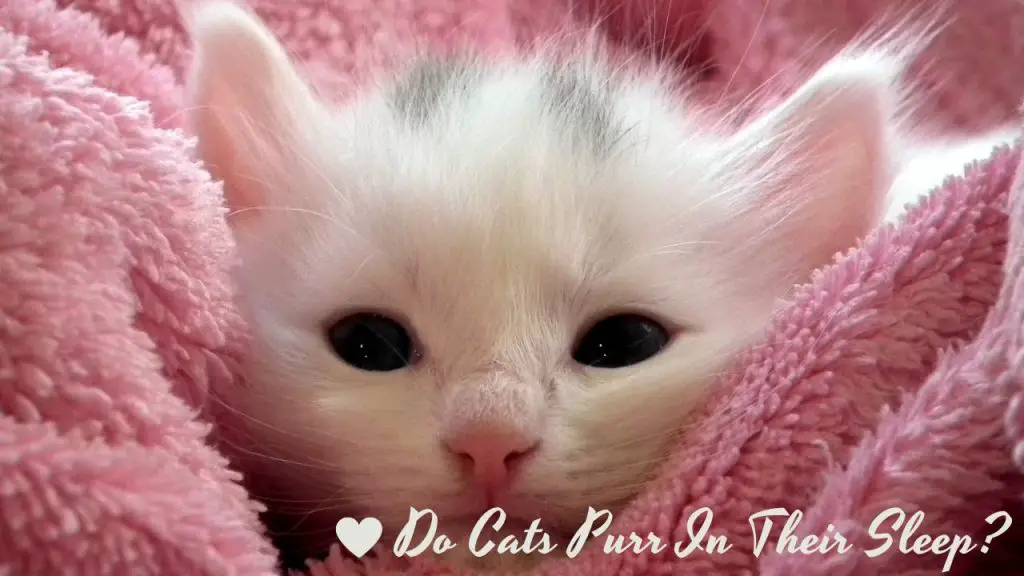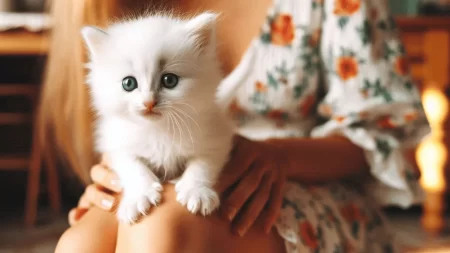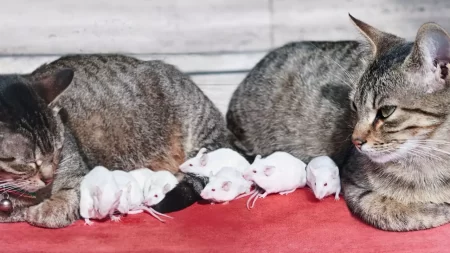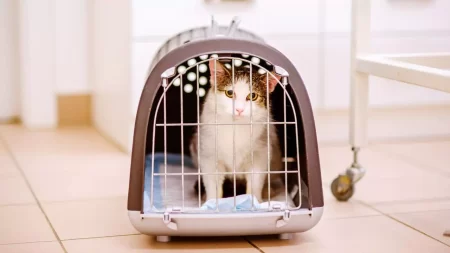Do cats purr in their sleep? It’s a feline mystery that has been baffling cat owners around the world for centuries. But don’t worry, we’re here to shed some light on the subject and help you understand your beloved pet a bit better. So, come join us as we investigate this mysterious behavior and reveal the secrets of cats and their purring habits!
Cats are unique creatures with unique behaviors that aren’t always easily understood by their human companions. When it comes to purring, cats can purr whether they’re awake or asleep. Purring is generally associated with contentment and happiness, but cats can also purr when they experience pain or distress. Therefore, knowing more about cat behavior and what causes cats to purr – and when – can help owners better understand them.
In order to explore the question of why cats purr in their sleep, we must first look at the science of purring in both awake and sleeping cats. What is the meaning behind this sound, and why might it carry on even when a cat’s not fully aware of its surroundings? Purring has been documented throughout history, long before the advent of modern science. We now know that the source of a cat’s purrs isn’t just an expression of emotion; they make this distinctive sound as a means of internal communication too.
Below we discuss how difficult it is to decipher the true reason behind why cats may continue to purr during their REM cycles – is it contentment or pain? We also cover common theories as to why some cats may be more likely to keep up this rumbling regardless of their state of consciousness.
What Does Purring Mean?
The purr is perhaps the most well-known sound of a cat, and many people believe that purring is an expression of happiness. While it’s true that cats often purr when they are content and relaxed, it has also been observed in cats that are experiencing pain or other forms of distress.
In general, cats may purr to communicate contentment or pleasure when they do things like greet their owners, have their bellies rubbed, or curl up for a nap. The vibrations associated with the purr can also act as a self-soothing mechanism—allowing cats to better tolerate physical discomfort or even heal after an injury or illness. In addition to indicating contentment, kittens may use their purrs to signal hunger and call for attention from their mothers for food or comfort.
Cats do appear to be able to purr in their sleep, although the intensity of the sound often diminishes in comparison to when they are awake. A sleeping cat may also abruptly stop purring if startled by outside noise or movement from another creature sharing its company.
Do Cats Purr in Their Sleep?
Do cats purr in their sleep? The answer is yes. Cats, like other animals and even some humans, can show signs of pleasure in their sleep. It’s actually quite common for cats to purr while they sleep.
For many years, scientists believed that purring was a reflexive behavior or form of self-soothing that cats and other animals displayed in response to mild pain or discomfort. However, more research suggests that it may also be a form of communication – both with other cats and with humans.
Cats who are sleeping will often purr as a way to show affection or contentment among themselves and anyone else who may be near them. Domestic cats are not known for being overtly affectionate towards humans, so when your cat is lying there purring it could mean she is feeling safe, content, and loved in your presence!
It’s also worth mentioning that cats don’t only purr when they’re asleep – sometimes this sound can occur when a cat is playing or happy about something; it’s just the sound of pure joy! So if you hear those noises coming from your kitty while sleeping – don’t worry. It means your cuddly companion is just enjoying his rest time!
Benefits of Purring
Purring is often associated with contentment and happiness in cats, but it serves many other purposes as well. Not only can purring help cats sleep and heal faster, but it can also be used to communicate with other cats or humans.
Cats normally purr during both inhalation and exhalation when they are content and relaxed. By doing this, cats may be able to soothe themselves in stressful situations or form a bond with their owners. Studies have shown that the high frequency of purrs at around 25 Hz, which is close to the frequency of many healing machines, can stimulate bones and tissues to repair themselves more quickly than normal.
Purring can also be used as a form of communication between cats – kittens will call out for help from their mothers with a distinctive meow-purr sound whereas adult cats may emit softer purrs or sounds when greeting or seeking attention from others. Purrs have even been observed as interactions between animals of different species such as a cat purring when interacting peacefully with a bird or dog!
The act of purring has many benefits for both cats and humans alike – whether they are feeling sleepy, playing together, or even healing after an injury! Next time you see your cat adding soothing tunes to your house make sure you give them an extra pat!
Reasons Why Cats Purr
Purring is one of the most fascinating and endearing qualities of cats. Cats often purr when they receive attention or when they are happy and content. Interestingly, though, cats may also purr in response to stress and pain.
Understanding the reasons why cats purr helps deepen our bond with them, deepening understanding and appreciation of the purposes behind their behavior. Researchers have observed that not only do adult cats purr, but kittens even begin to purr soon after they are born.
Cats make several vocal sounds including hissing, growling, meowing, and caterwauling – but they typically reserve purring as a special type of greeting to humans as well as other felines. Below are some of the common reasons why cats may purr:
Contentment: Cats generally purr when relaxed or in a comfortable setting to show contentment or joyousness
Soothing: Cat experts believe that kittens may start to purr almost immediately after birth as a way to soothe themselves during stressful times or in uncomfortable situations
Communication: Purring is typically associated with warm social exchanges between two cats including rubbing noses and grooming each other
Healing: Purring vibrations contain frequencies known for improving bone density and healing wounds or injuries
Comforting/Attention Seeking: Some cats will also use their signature sound (purring) when feeling scared or vulnerable as a way of seeking comfort from their owners
How to Tell if Your Cat is Purring in Their Sleep
Purring is an expression of contentment and relaxation in cats, so it’s not uncommon to wonder if cats purr in their sleep. While cats do indeed purr when napping or sleeping, it’s not always obvious to their owner. By understanding how cats purr when sleeping and other signs your cat is dreaming, you can learn to recognize when they are enjoying a good snooze and purring away.
One way to tell if your cat is purring while asleep is by their face. If a cat’s mouth is slightly open and their facial muscles remain relaxed while they snooze, chances are they are purring away. You can also look at the sound of their breathing – you may notice it fluctuating or getting louder in a rhythmic pattern as your cat takes deep breaths intermittently while in dreamland. When paired with the gentle vibrations associated with purring, this can be a tell-tale sign that your cat is indeed wrapping up their nap with some joyful noise!
Another way to tell if your kitty is purring in their sleep is by listening for vocal noises during naps or attempting to initiate contact through kneading behaviors often seen when cats are dreaming. If you notice any sudden twitches or body movements alongside these categories during naps, this could be another indicative sign that your feline friend may be (not surprisingly!) dozing off peacefully with some cute mews and rumblings from satisfied contentment.
Whatever age they may be, all felines deserve adequate rest – including plenty of fun dream-filled respites involving sleepytime snuggles and gentle purrs!
Tips for Keeping Your Cat Purring
Purring is a sound that signals contentment in cats, and it’s one of the main ways they show their love. But do cats purr in their sleep? The answer is yes — but understanding why cats purr can help you ensure your furry little companion is truly content.
Some cats may purr when they’re feeling anxious or lonely, but typically, purring indicates comfort. When cats are snuggled up with their humans, they often start purring loudly and happily. This soothing sound usually comes right before sleep or after a meal — both comfortable experiences for your cat!
There are several ways to keep your cat happy enough to keep those sleepy-time purrs going all night long. Try out the following tips to get your furry friend comfortable and relaxed:
- Provide plenty of comfy places for them to rest their head during the day (cat beds, windowsills).
- Provide ample playtime during the day so that our cat is exhausted come bedtime.
- Avoid waking up your cat suddenly; instead, allow them 30 minutes to slowly wake up on their own.
- Feed high-quality food that’s tailored to your cat’s nutritional needs; ask your vet for recommendations.
- Establish an age-appropriate routine and stick to it; cats are creatures of habit and enjoy the security of routines.
These tips will help keep both you and your feline friend happy and content!
Conclusion
After reviewing the results of our research and anecdotal evidence, it appears that cats may purr in their sleep, or at least make faint purring-like noises. Some scientists hypothesize that it is a form of self-soothing and stress relief. However, more research is needed to definitively answer this question.
It has also been suggested that cats purr in their sleep as a sign of contentment and well-being; just like people might express their happiness with a broad smile while they are sleeping.
Ultimately, regardless of why cats purr while they are sleeping, it remains clear that purring is a positive expression of contentment. Therefore, if you want to keep your feline companion healthy and happy, you should try to provide him with plenty of love and attention when he’s awake – as well as when he’s snoozing!







